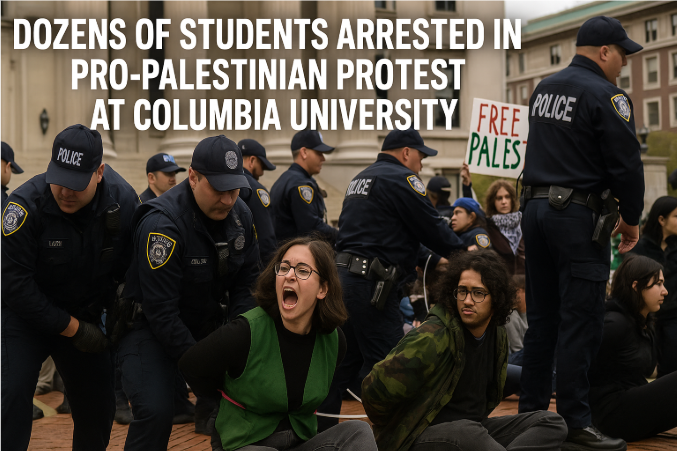
Dozens of Students Arrested in Pro-Palestinian Protest at Columbia University
Introduction
On May 7, 2025, Columbia University became the epicenter of renewed pro-Palestinian activism as dozens of students were arrested during a protest at the institution's Butler Library. This demonstration is part of a broader wave of campus activism across the United States, reflecting deep-seated concerns over the ongoing conflict in Gaza and the role of academic institutions in global political dynamics.
The Protest Unfolds
The protest was organized by Columbia University Apartheid Divest (CUAD), a coalition advocating for the university's divestment from companies profiting from what they term as "imperialist violence" against Palestinians. Demonstrators occupied a section of Butler Library, displaying Palestinian flags and chanting slogans such as "Free Palestine," aiming to draw attention to the university's financial ties and perceived complicity in the Gaza conflict .
The university administration, citing disruptions to academic activities and safety concerns, authorized the New York Police Department (NYPD) to intervene. Subsequently, more than 70 protesters were arrested on charges including trespassing and disorderly conduct . The arrests mark one of the most significant crackdowns on student activism at Columbia since the Vietnam War era.
Administrative Response and Federal Implications
Columbia University's acting president, Claire Shipman, condemned the protest, labeling it as a violation of university policies and emphasizing the institution's commitment to maintaining a safe and inclusive environment for all students . The university's decision to involve law enforcement has sparked debates about the balance between free expression and institutional order.
The federal government, under the Trump administration, has taken a keen interest in campus protests. Secretary of State Marco Rubio indicated potential visa reviews for foreign students participating in such demonstrations, framing them as "pro-Hamas agitators" . This stance has raised concerns about the suppression of dissent and the targeting of international students based on political beliefs.
Broader Context of Campus Activism
The events at Columbia are part of a larger pattern of student-led activism in response to the Gaza conflict. In April 2024, pro-Palestinian students established the "Gaza Solidarity Encampment" on Columbia's campus, demanding divestment from companies linked to Israeli military actions. The university's response, including mass arrests and administrative sanctions, has been met with both support and criticism from various stakeholders .
Similar protests have erupted at other institutions, such as the University of Washington, where students occupied buildings to demand institutional divestment from companies like Boeing . These movements underscore a growing trend of student activism intersecting with global political issues.
Legal and Human Rights Concerns
The arrests and subsequent legal actions have raised significant human rights concerns. Advocates argue that the suppression of peaceful protests infringes upon First Amendment rights and sets a dangerous precedent for academic freedom. The targeting of international students, in particular, has drawn criticism from legal experts and human rights organizations, who view these actions as discriminatory and politically motivated.
Cases like that of Mohsen Mahdawi, a Palestinian student arrested during a citizenship interview, highlight the precarious position of international students engaged in activism. Mahdawi's arrest was deemed by a federal judge as potentially retaliatory, emphasizing the need for vigilance in protecting civil liberties .
Community and Academic Reactions
The university community remains divided over the protests and administrative responses. Some faculty members have expressed solidarity with the students, emphasizing the importance of academic freedom and the right to protest. Others have raised concerns about campus safety and the potential for antisemitic sentiments to emerge during such demonstrations.
The broader academic community is grappling with similar tensions, as institutions seek to balance free expression with the need to maintain inclusive and respectful environments. The Columbia incident serves as a focal point for these ongoing debates.
Conclusion
The arrest of dozens of students during the pro-Palestinian protest at Columbia University underscores the complex interplay between student activism, institutional policies, and federal oversight. As universities navigate these challenges, the need to uphold civil liberties while ensuring campus safety remains paramount. The events at Columbia serve as a reminder of the enduring power of student voices and the importance of protecting the rights that enable them to be heard.
SEO Optimization Paragraph:
This article delves into the recent pro-Palestinian protest at Columbia University, highlighting the arrest of students and the broader implications for campus activism, academic freedom, and civil liberties. By examining the intersection of student-led demonstrations, university policies, and federal responses, we provide a comprehensive overview of the challenges faced by institutions in addressing political dissent. Our analysis underscores the importance of safeguarding free expression and the rights of international students amid increasing scrutiny. Stay informed on the latest developments in campus protests, student activism, and human rights issues by following our in-depth coverage.